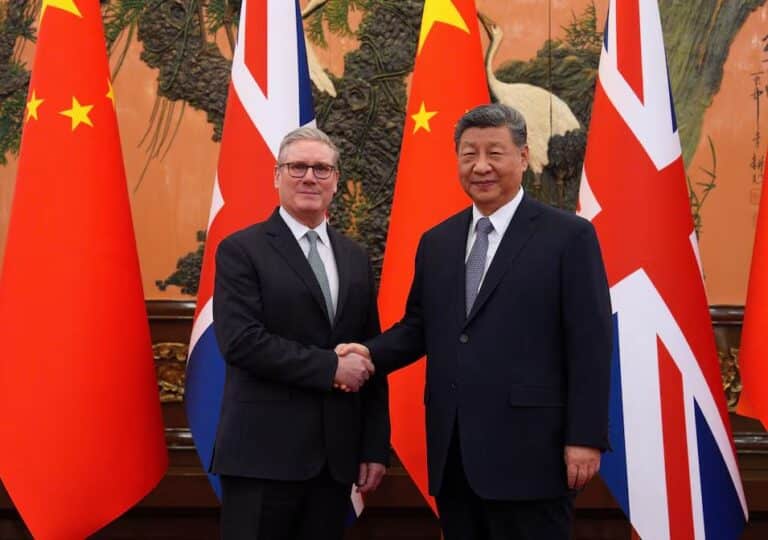
India’s rapid economic growth and digital innovation have placed the country at the center of the global technological evolution, according to the World Economic Forum (WEF). On the opening day of the WEF Annual Meeting 2025, the Centre for the Fourth Industrial Revolution (C4IR) India launched its 6-year impact journey report, underscoring the country’s contributions to shaping a human-centric, technology-driven future.
The WEF’s collaboration with India spans over 40 years, evolving from a foundational partnership to a strong, multifaceted relationship. This partnership has fueled India’s commitment to leveraging technology for societal good, particularly in areas like agriculture, healthcare, and sustainable urban development.
At the heart of this evolution is C4IR India, launched by Prime Minister Narendra Modi in 2018. As a key flagship center of the World Economic Forum, C4IR India has become a hub for harnessing emerging technologies like AI, space tech, and climate tech. The center’s efforts focus on ensuring technology acts as a bridge to inclusive development, addressing complex global challenges in a way that benefits millions of citizens.
India’s advocacy for developmental frameworks where technology is seen as a solution, not a barrier, is recognized globally. The WEF report lauds this approach, emphasizing the importance of the partnership between India and the Forum in advancing shared goals for a resilient and sustainable future.
C4IR India has been instrumental in driving progress through various initiatives. Its AI-driven agricultural programs have significantly boosted farmers’ incomes, while healthcare solutions have expanded access to life-saving services, particularly in underserved regions. The center has also been involved in creating sustainable urban development models that improve the quality of life in cities.
Since its inception, C4IR India has positively impacted the lives of 1.25 million citizens, enhancing livelihoods and healthcare access. The center has proven to be a vital engine of change, setting benchmarks for technological progress in India’s agriculture, healthcare, and aviation sectors. As the country moves into the next phase of its technological evolution, C4IR India is now expanding its focus to emerging areas like AI, climate technology, and space technology, with the potential to create lasting value for society.
Jeremy Jurgens, Managing Director of the World Economic Forum, highlighted that the centre has become a hub for multi-stakeholder collaboration. “C4IR India has driven Fourth Industrial Revolution technologies across agriculture, health, and aviation, setting a benchmark for transformative progress. As the center continues to grow, it is now focusing on cutting-edge areas like AI, climate tech, and space tech, with exciting potential for creating lasting value for society,” Jurgens said.
The Indian government’s commitment to these advancements is exemplified by S. Krishnan, Secretary of the Ministry of Electronics and Information Technology (MeitY), who emphasized the importance of leveraging Fourth Industrial Revolution technologies. “Our partnership with C4IR India is pivotal in addressing critical challenges in health, education, smart cities, and agriculture,” Krishnan stated. He also highlighted the AI for India 2030 initiative, a collaboration between MeitY and C4IR India, which aims to unlock the full potential of AI for societal benefit.
India is also positioning itself as a global leader in the space economy. The Space Economy initiative, which aims to boost India’s space technology capabilities, is a key focus for C4IR India. This initiative will enable India to enhance its presence in the global space market, fostering innovation and technological leadership.
Another significant project is the Climate Technology programme, which focuses on developing climate-smart urban centers in India. With urbanization rapidly increasing, this initiative aims to create sustainable cities that are resilient to climate change and provide a high quality of life for their residents. These projects align with India’s broader vision of achieving long-term sustainability while driving economic growth.
The report from C4IR India outlines the positive impact of these initiatives, noting that multi-stakeholder collaboration is essential for scaling technologies to address complex challenges. By working closely with governments, businesses, and other stakeholders, C4IR India is driving innovation that has the potential to create profound change not just in India, but globally.
India’s commitment to integrating technology for social good and sustainable development makes it a leading example for the world. As the nation continues to leverage emerging technologies, its position at the forefront of the technological revolution is poised to have a lasting global impact.
With C4IR India leading the way, India is proving that technology, when used responsibly and inclusively, can be a powerful tool in creating a more resilient, equitable, and sustainable future for all.







